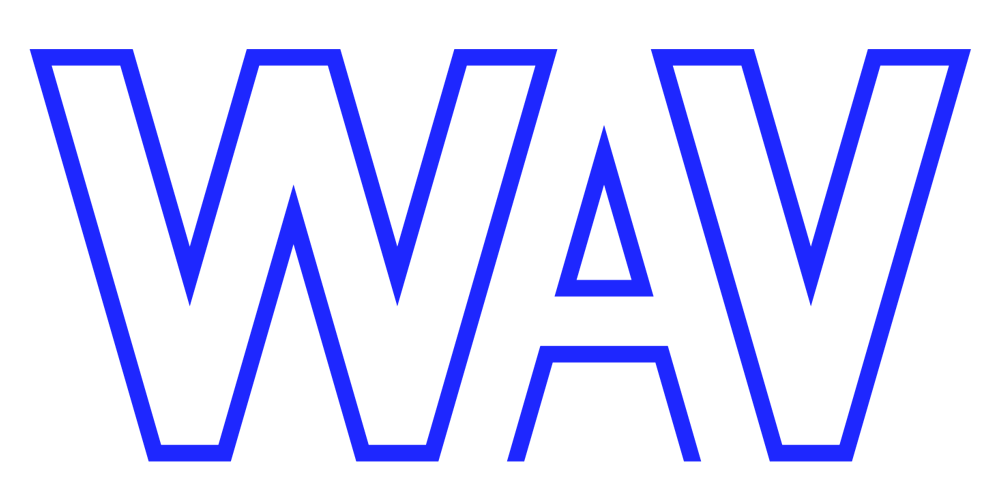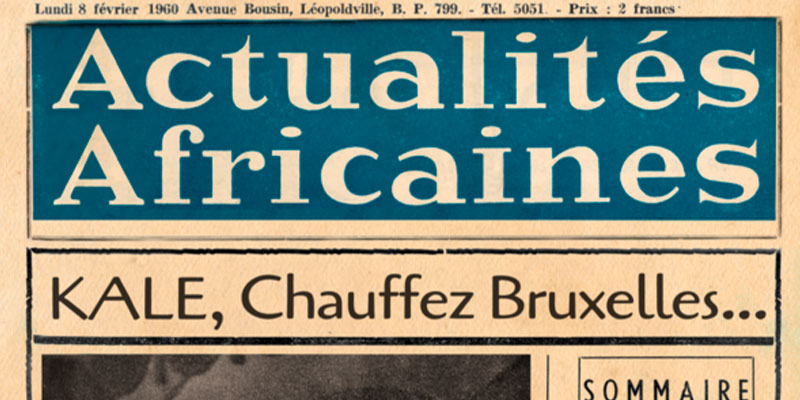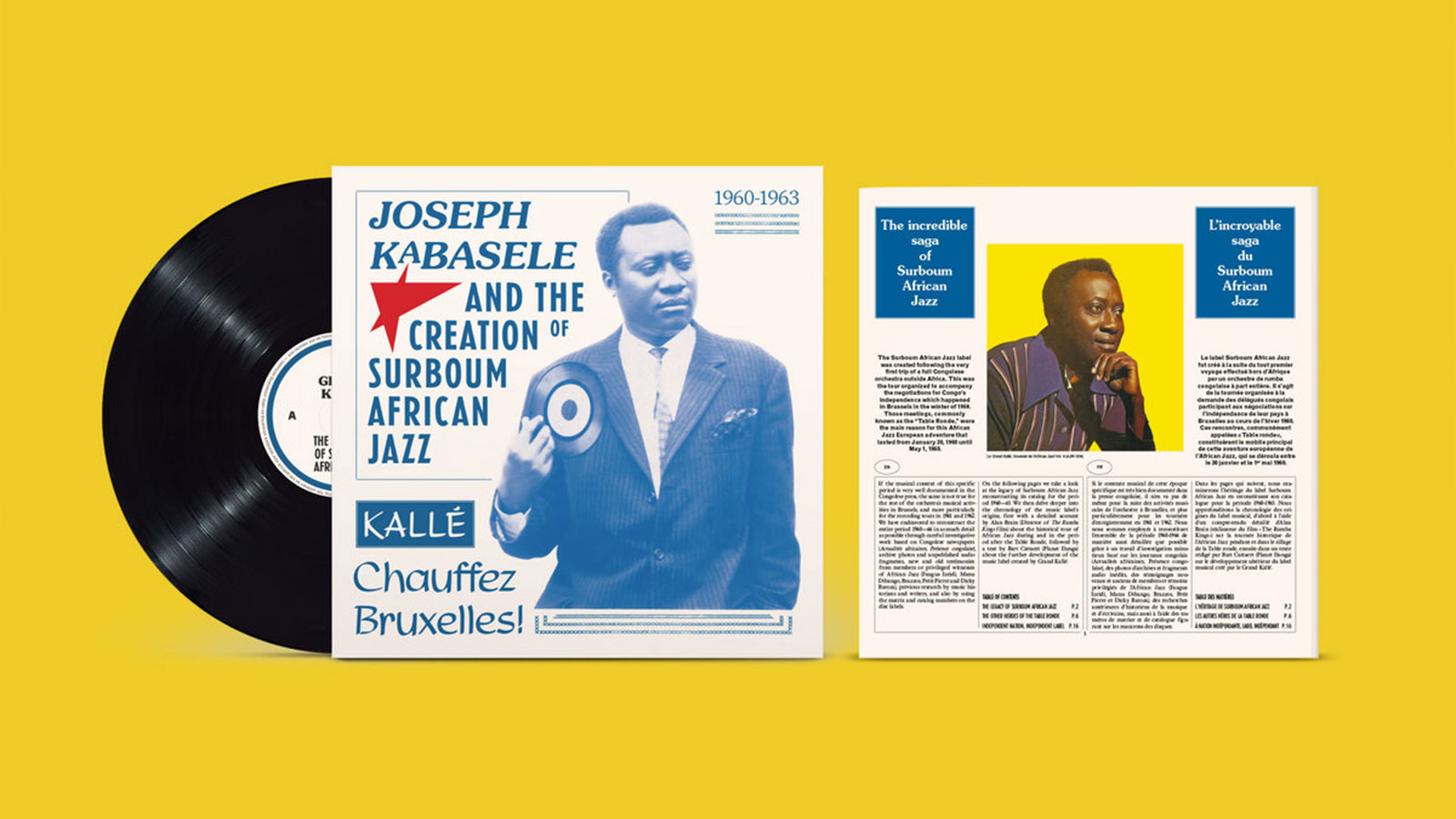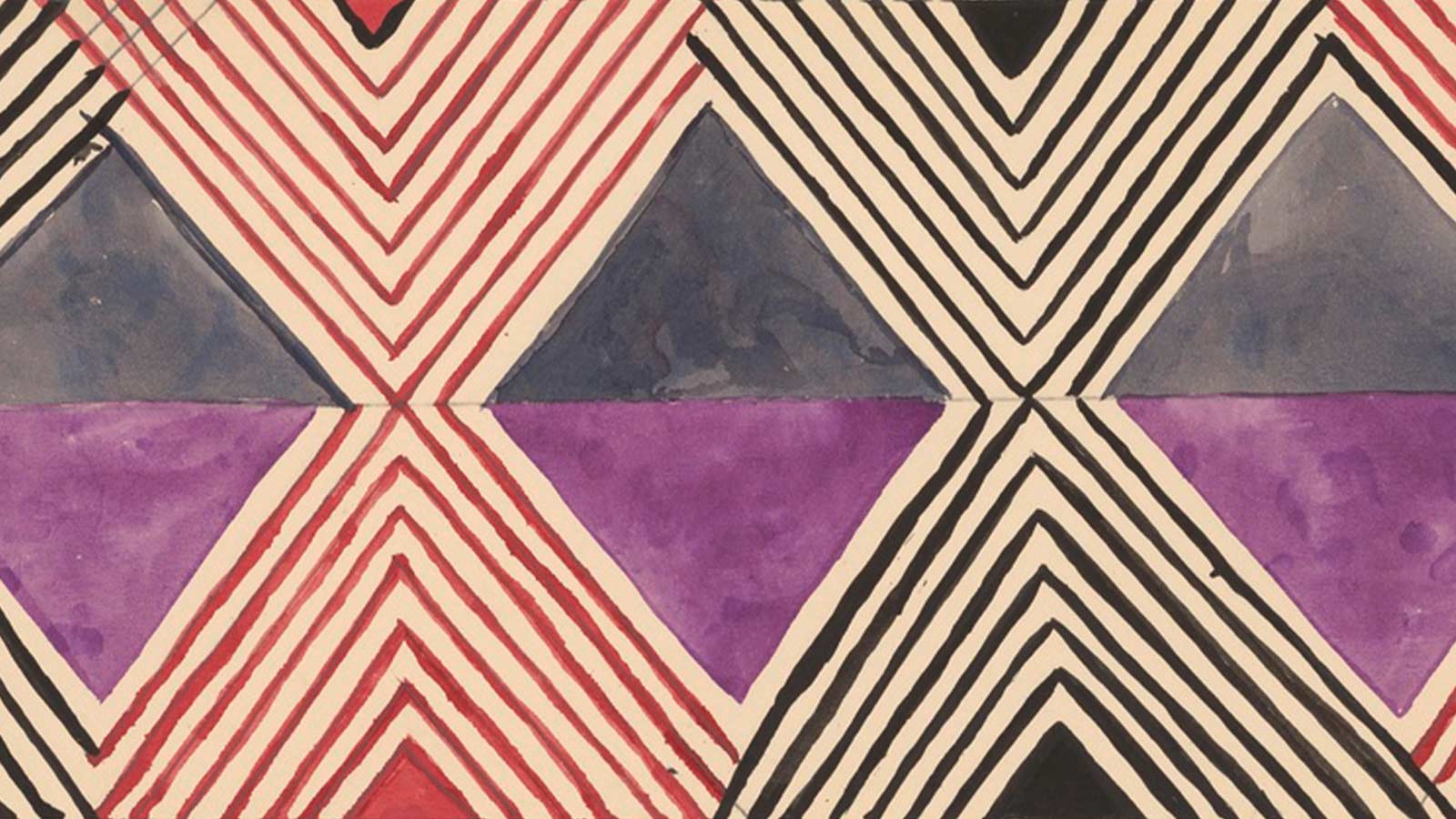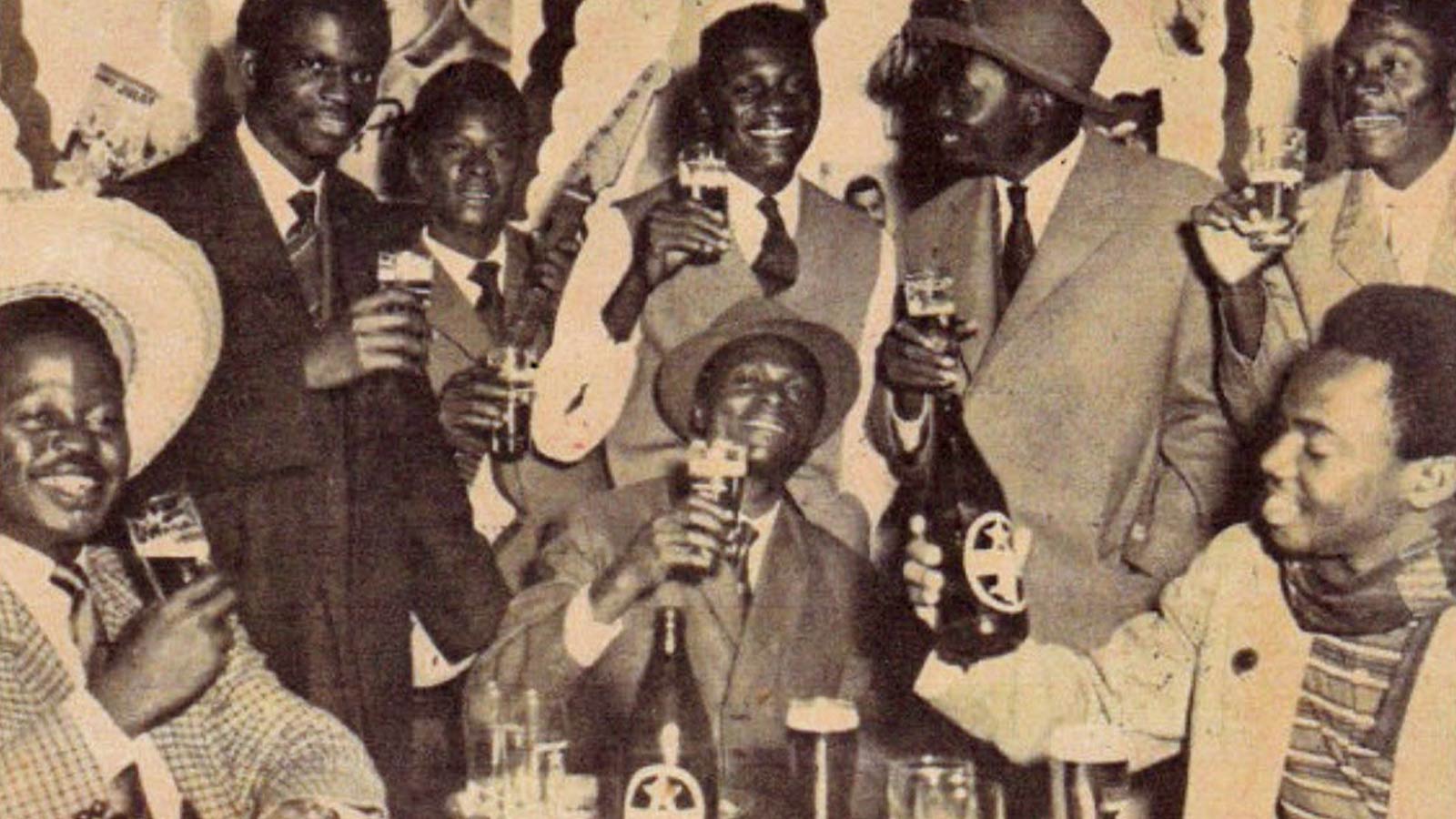Planet Ilunga is an independent Belgian vinyl label focusing on music that is at first sight untranslatable. It specialises in archiving, documenting and sharing the “Rumba Lingala” sound from the fifties and sixties from both the Congos. Planet Ilunga wishes to contribute to restoring the rich Congolese music archive, in the first place through high quality vinyl records and extensive booklets.
Friday 16th of July, Planet Ilunga’s Bart Cattaert will be playing Congolese singles and some other genres, during the apéro Congoville at MIKA café, in the framework of the Congoville expo at the Middelheim Sculpture Park. A number of records of their catalog will be for sale that evening.
Bart was so kind as to answer some questions for us.
WAV: Hey Bart, can you briefly introduce our listeners to the Planet Ilunga record label?
BC: Planet Ilunga exists since 2013 and specializes in uncovering and highlighting the overlooked yet epic achievements in the world of Congolese rumba. Eight years later, the discography of the label consists of nine releases, of which seven double LP albums, one LP and one 45 rpm single. Until now, the main focus was on the period ‘50 to ‘70 and on the big names in modern Congolese music such as Grand Kallé, Franco, Docteur Nico, etc. I’m running Planet Ilunga mostly by myself, but I can count on the help and assistance of Zoi Sakka and a generous community (both Congolese as international) of experts, family members of the most important artists who are sadly no longer with us, fans, authors, journalists and record collectors of this music. Thanks to them, and I cannot emphasize this enough, it’s possible to collect, document and publish a lot of this information, photos and music.
WAV: What does the word Ilunga mean?
BC: Some months before starting the label, a friend had sent me an article on the BBC website about “the world’s most difficult words to translate”. According to the article, 1,000 language experts had identified the word ‘ilunga’ as the hardest word to translate. They gave the following meaning to this Tshiluba word: ‘The willingness of a person to show mercy for mistakes. The process of forgiving any abuse the first time, to tolerate it a second time, but never a third time’. I always liked the idea and the poetry of untranslatable words, so I made a combination with ‘Ilunga’ and ‘Planet’. I wanted to have the word ‘planet’ in the name, to honor (or copy) one of my favorite labels, the Detroit Techno label Planet E Communications. So Planet Ilunga was born. After a couple of years, I started to have reservations about the meaning of the world ilunga as published in the aforementioned article. So, I asked a Congolese contact who is specialized in languages, about the origins of the word ilunga or its etymology. I got this as an answer: ‘Mythological meaning related to the Luba empire. Visionary guide and enlightened leader. The name derives from the title of the ancestor of the Luba, the founder Ilunga Mbidi. It means leader, unifier and fearless warrior. I believe this is a more accurate version of the truth. In short, I think the article on the BBC and on many other news sites was a PR story of a translating agency. Fake news avant la lettre…
WAV: Where did your interest and fascination for Congolese music originate from? And why did you decide to start a label releasing this music?
BC: A part of my family was born and grew up in different cities in Congo (Lubumbashi, Mbandaka, Kalemie, Kisangani), so maybe the fascination and appetite for Congolese music derives from this. But to be honest, I just discovered this music through a CD compilation, which was released around 2004, with all the big names on it. I immediately got hooked to this music, especially because of the melodies and the way of singing and the vocals in Lingala which is a very musical language. When I started to read specialized music blogs such as muzikifan, the excellent worldservice, afrodisc.com and books of authors like Manda Tchebwa, Clément Ossinonde, Sylvain Bemba and Gary Stewart about Congolese rumba, I was fascinated by the richness and history of all the protagonists in this music scene. At the same time, there was frustration because a lot of the songs I was reading about, were impossible to find on records or even CDs. So, I decided to start a platform to release some of them. At that time, I couldn’t realize how big this music scene between the fifties and the eighties in both the Congo’s really was. Now I can say the Congolese people have one of the world’s most interesting musical heritages. The number of bands, music labels and different genres in Congolese modern music from that time is unequaled in Africa. Also, Congolese rumba is, since its development in the fifties, highly influential in many African countries.
WAV: Also, more than releasing just music, you are doing thorough research, write extensive liner notes and so on. What did trigger you to dive into this rich cultural heritage, with a more than average appetite?
BC: Apart from curating the selection of the songs, my main goal with this label is to write the stories. I do this because I like it and I feel there is a need to document this archive. On earlier releases of this music, not to mention the releases on the different labels of Sonodisc, there was never any context or information given, resulting sometimes in compilations that are not very coherent and with many flaws. That’s why I try to do it differently. In the beginning it was difficult to find first-hand information, but slowly and by expanding my network and sources of information, things got better. But still, every time I’m working on collecting the information, I have to think of this quote of the Belgian journalists and filmmakers Jean-François Bastin and Isabelle Christiaens: “History in the Congo is a luxury. She doesn’t write herself, she tells herself. Memory is everywhere and nowhere. Each owns a piece of it. […] The present is too hard and the past is too painful. The wounds are still too sharp.”
WAV: Can you explain why rumba was and is such a big thing in Congolese music? Where does the ‘Rumba Lingala’ term come from? What feature(s) distinguish(es) it from other rumba?
BC: The story of how rumba came to Congo-Brazzaville and the Democratic Republic of the Congo is complex and you need a book or thesis to contextualize this. Many Congolese scholars and authors published already about this and I’m sure it will be further explained in the report that Congolese experts are currently writing on behalf of the inscription of Congolese rumba to the cultural heritage list of Unesco. Just like the Cuban rumba which is part of this since 2016.
‘Rumba Lingala’ is the name that started to appear on the center labels of the 78 rpm records that were published as from 1946 in Congo. Cuban music genres such as son montuno played of course a significant role in the development and evolution of Congolese rumba. For example, listen to this Wendo record from 1946 and the original of Lecuona Cuban Boys from the mid thirties. Or from the early sixties, ‘Kayi Kayi’ versus ‘Cayetana’. There are many examples like that in fifties and sixties Congolese music. As you can hear in the aforementioned songs, the use of the guitar was prominent in Congolese rumba, unlike the Cuban version. But of course Congolese rumba, which I see as the collective term for different Congolese music genres, was not limited to only Cuban influences. The Congolese musicians were influenced by many and different popular music genres from all over the world and by their own traditional music and dances. I believe the artists at the time had the ability and the sheer talent to modernize this and to make all those (foreign) genres their own. What also strikes me is the flair of certain Congolese artists such as Franco or Docteur Nico to fusion modern and traditional music. Listen to Kamulangu of Docteur Nico or Sansi Fingoma Ngoma of Franco.
WAV: Does the label and the music that it releases have a close connection to Brussels and the African diaspora? If so, in what sense?
BC: Although all of the music labels in the forties and the fifties were controlled by European people, Congolese rumba has always been something from the Congolese people. It’s music that is truly close to its people, with international and local rhythms and, mostly, local or personal lyrics. During and after the independence in 1960, a lot of the bands came to Brussels to record in the music studios here which were better and they also found music labels. As from the sixties, most of the recordings took place in Belgium. The musicians were here very often. Quite some children and relatives of the best Congolese artists back then grew up in Belgium or France.
WAV: The label just released a new record on the 30th of June. Can you tell us something about this freshly released record?
BC: It’s an anthology about the first Congolese music label created by a Congolese. The name of that label was Surboum African Jazz and it was founded by Joseph Kabasele, alias Grand Kallé in 1961. This was a very important event in the history of Congolese music. You can describe it as the sound of a cultural emancipation for Congo. Kabasele’s label paved the way for Congolese bands to tour outside Congo and Africa, and encouraged Congolese entrepreneurs to start their own music labels. They should build a statue or a museum for Grand Kallé in Kinshasa.
In the booklet we have reconstructed the timeline of what happened during 1960-1963 in as much detail as possible. The whole story is being told through testimonials, old newspaper extracts, interviews and unpublished photos. There are many testimonials of Congolese people and Alan Brain, director of The Rumba Kings documentary, shared his research of what happened during the stay of African Jazz in Belgium in the winter and spring of 1960. It’s a fantastic story. I have put this text on my website.
WAV: What does the sentence “Kallé, Chauffez Bruxelles”, that we see coming back on your Bandcamp page and Facebook page, reference to?
BC: ‘Kallé, Chauffez Bruxelles’ was the headline and cover photo of the February 6 edition of Actualités africaines, a Congolese newspaper. One week before, Kabasele and his band members of African Jazz had just arrived in Brussels at the occasion of the Belgo-Congolese Round Table Conference. In the next weeks and months, the band would conquer Belgium with its music…
WAV: How would you like to see the label evolving in the next few years? What would happen with the label, if you are allowed to dream wildly?
BC: Everywhere in the world, not only in Europe, I see young people starting music labels, be it digital or with physical releases. This cultural entrepreneurship I hope also to observe in Kinshasa sooner or later. Of course it makes me sad that there is not really a structured Congolese music industry now, unlike here where we have the privileges and means of doing this kind of projects. So my hope is to see Congolese music labels arise, just like in the sixties-eighties when there was a plethora of labels and groups in Kinshasa. As the Congolese artist Barly Baruti said in the booklet of the new compilation ‘We need modern Grand Kallés in Congo today…’ As for the future plans of the label, I would like to continue promoting and highlighting other important but neglected Congolese artists and sharing their stories. And I hope to be able to share these stories also through other media, such as exhibitions, film, radio… Also, in the next years I would like to create a new music label. Something more contemporary which will focus on my first love which is electronic music (techno, electro, hip-hop etc.).
WAV: What would be the ideal location for the listeners of the Planet Ilunga music to experience the music?
BC: In their own imaginary planet.
WAV: Can you reveal us a bit of what you intend on playing on Friday? Records that you will definitely play, and why?
BC: From Kinshasa to Cuba and back, to Madrid, to Kingston, to Bombay, to Chicago, to Detroit, to Phoenix, to Tokyo, to Athens, Belgium and so on.
WAV: What is/will be the tune of your summer 2021?
BC: I’m happy the beautiful album ‘Turiya Sings’ of Alice Coltrane will be finally out on a quality reissue. As this music is more for the winter, I pick TJ Hustler: eccentric, spaced out, playful, original music with an Arthur Russell cosmic disco feel.
WAV: What’s the first sound or song ever that you can consciously recall?
BC: Father who broke my Gameboy. It’s more fun to play outside.
WAV: Is there a Congolese artist (other than musical artist) that you would like to recommend?
BC: The water and ink colors of Thela Tendu alias Djilatendo. I will gladly visit the Congoville exhibition before the dj set to discover the selected artists.
Thank you for the interview!
[Interview by Daphné ]
